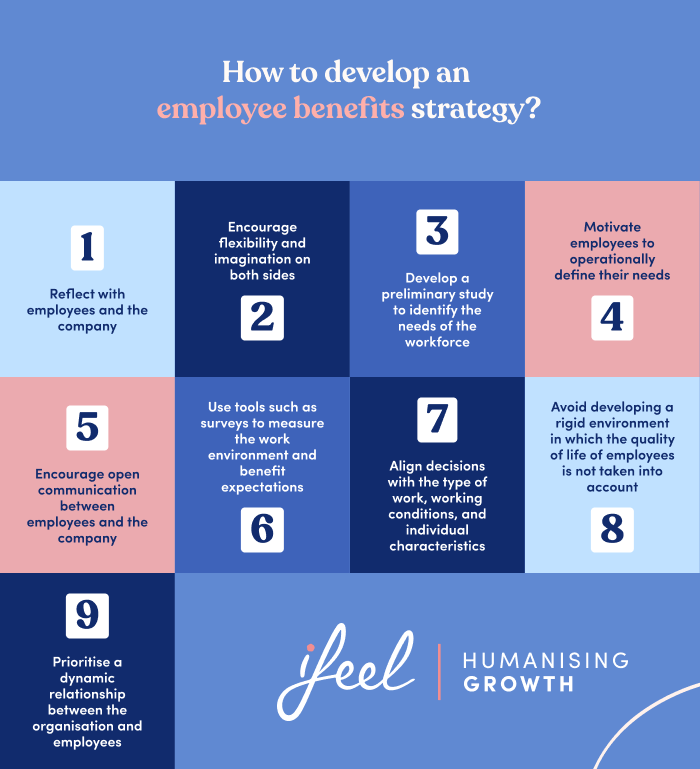Employee benefits for companies and, therefore, social benefits are a set of measures that companies use to reward their employees’ work and that do not directly consist of a monetary benefit. As such, they are an instrument that can be very valuable in improving certain aspects of employees’ lives, with the expectation that this will result in their performance and productivity and in attracting, developing, and retaining talent.
Essential employee benefits for companies: mental health
Social discourse, in general and that of employees, in particular, could be characterised, among other things, by placing the importance of taking care of mental health at the center of demands and as employee benefits for companies. A constant allusion is made to the psychological well-being of employees, especially to talk about its gradual deterioration, the psychosocial risk factors that threaten it, and the lack of real opportunities that large sectors of the population have to access professional mental health care.

Like so many other phenomena, this discourse stems from causes that are more or less distant in time.
1. Immediate triggers
To begin with, it is the result of short-term triggers, for example, news related to mental health problems -especially of public figures- that achieve enormous notoriety through the media and social media.
2. Close history
Secondly, more distant precedents, such as the almost two years we have lived with the pandemic and its consequences.
3. Remote precedents
Of course, the more remote precedents must also be mentioned. Here we would place the long development of a system of work that is voracious, competitive, and more focused on results than on processes (therefore, more oriented to ends than to means). A system in which employee benefits for companies is not very effective in achieving a real advantage in terms of their well-being at work.
In short, we come from a time when the psychological safety of employees has been a secondary, even tertiary, issue, unlike the official discourse with which many companies now associate themselves.
| What are employee benefits? | Employee benefits are the goods or services received by the employees of a company, in addition to their salary, for their work. They are designed to improve the employee’s quality of life. |
| Employee benefits | – It is a service or product that improves your well-being and is often essential. – Taxed to Social Security |
Company benefits | – Employee benefits favor talent retention – They are a tool that improves employee satisfaction. – They can also improve the organisational environment and motivation. |
Most popular benefits | – Emotional well-being – Food – Transport – Medical Insurance |

Employee benefits: the relationship
When designing an employee benefits strategy that is appropriate to a company’s current circumstances, it is important to consider what employees are looking for in a company. It is not just a matter of wishes, such as those satisfied through an act of “generosity”. Rather, it is about having a balanced relationship.
The idea of commitment, loyalty, fidelity, ownership, identification, and belonging are so often alluded to in the workplace context only reinforces another idea that brings them all together: what happens between the company and its employees is a relationship.
Whether the employees are aware of it or not, this link between them and the company they work for is not limited to the so-called “employment relationship” in its most technical sense, which is formalised in the contract signed by both parties. Instead, it is a relationship that goes beyond the strictly contractual and also involves psychosocial aspects of enormous importance for the well-being of the employee and the company’s bottom line.
Join the global leading solution in mental well-being
Employee benefits: expectations
Employee benefits should be aligned with the aspirations, expectations, and needs of the workforce. When these are met, they have a positive impact on company productivity.
Generally, what employees value most has to do with salary but also with the way the company regards them professionally, the interest in the projects they work on, and the quality of relationships with colleagues and managers and the working environment.
They also tend to highlight as something very positive the fact that the company is flexible enough to adapt to the needs of the employees and that it is not always the employees who have to adapt in a unidirectional way to the needs of the company. Moreover, it is often very important -especially when it comes to working on interesting or meaningful projects- that corporate values are consistent with the employee’s personal values.
Post-pandemic employee benefits
All of the above would apply to the period immediately prior to the pandemic. It still applies now, of course, but a new nuance should be added: employees value highly the fact that the company is concerned about their well-being through concrete measures relating to mental health protection. These measures should be included in your employee benefits program or in some kind of incentive program aimed at improving motivation, so important in any context but especially in those that make it difficult to fully experience the corporate culture, such as working from home. Of course, these types of measures help to improve the work engagement of current employees and enhance the inbound recruiting strategy.
HR departments have realised this and are committed to investing in the emotional health of employees as a means of boosting the motivation and commitment of the most important resource they have (people) but only some companies are able to take proper care of it.
This is where the help that ifeel can provide to organisations in their objective of generating social benefit programs for companies that are really effective and make expressions such as “emotional salary” have real meaning for their recipients and prioritise prevention with an efficient criterion.
A guide to implementing a 360° well-being strategy
Not sure where to begin. We got you covered! Our team of occupation health psychologists has developed a guide to implementing a 360° well-being strategy. In this resource, you will find an evaluation that involves understanding the existing framework and identifying areas for improvement. Once the assessment is complete, the optimisation process can be divided into phases, allowing for a systematic approach to enhancing mental health support within the organization. In addition, you will also find an effective methodology known as the PEC (Plan, Execute, Check) framework, which provides a structured method for assessing the effectiveness of initiatives and interventions.

Mental well-being for companies
At ifeel, we know that having building an employee benefits strategy requires a lot of planning for the Human Resources team.
To support companies in this process, our team of expert workplace well-being psychologists has created a mental well-being solution for businesses that improves talent retention, reduces presenteeism, and combats employee stress.
With our mental well-being solution, your company’s HR managers can receive personalised, data-driven advice on improving mental health at work. In addition, this solution offers employees a 360° mental well-being service structured at different levels according to their needs. Try our solution now to see how it could help you.
We hope you found this article on the role of the Chief of Staff interesting. If you would like more information about our mental well-being solution for companies, just ask us and we will get in touch with your team as soon as possible.









